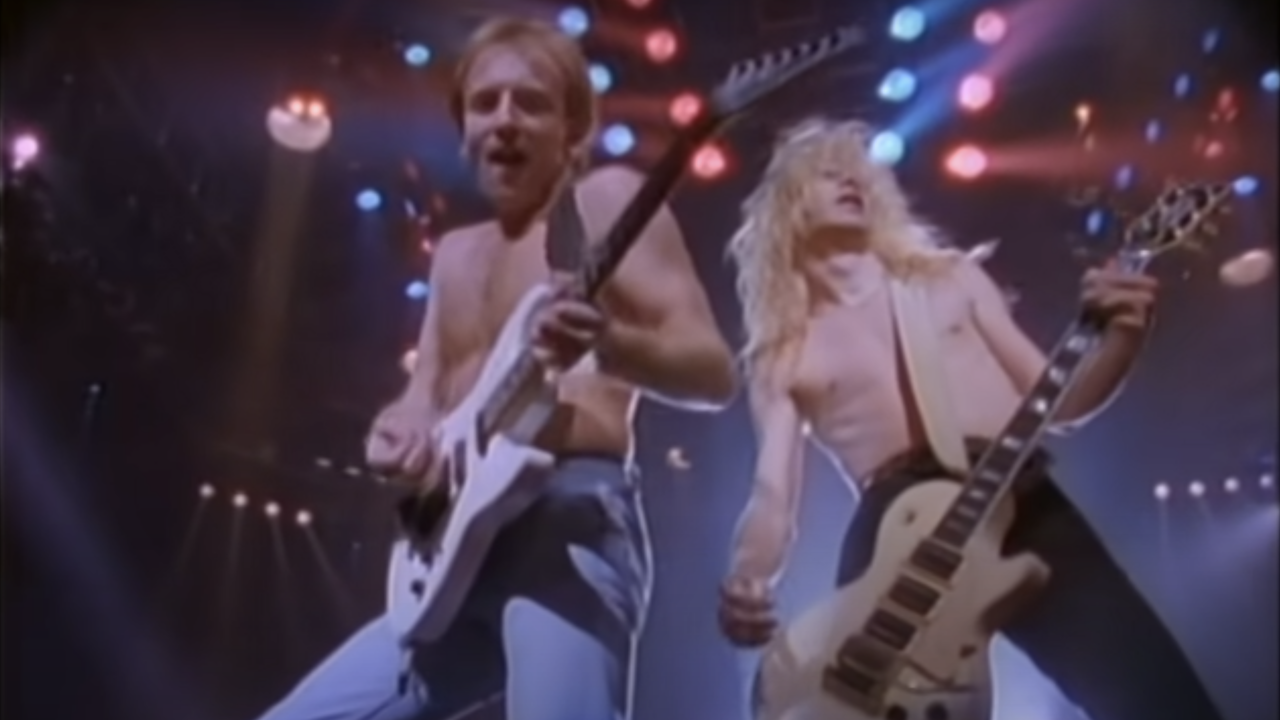
It’s no exaggeration to say that their 1987 album Hysteria took Def Leppard to hell and back. Over three years of aborted sessions, a sacked producer and relentless bad luck, the band’s fourth album was the 80s equivalent of Chinese Democracy, swallowing an estimated five million dollars from the moment recording began in early 1984.
The record’s emotional cost, however, became even more expensive, after a car accident on New Year’s Eve 1984 led to the amputation of Rick Allen’s left arm. The band were forced into hiatus, while the drummer bravely re-learned to play on a customised electronic kit. “You really would start to think that we were cursed,” noted frontman Joe Elliott.
By the end of 1986 the ordeal was finally firmly behind them. Or so the band thought. As Elliott and producer Robert ‘Mutt’ Lange were tying up the loose ends of Armageddon It at Wisseloord Studios in Holland, the singer reached for the acoustic guitar that was kept in the control room.
“As far as we were concerned, that was the final track,” Elliott remembers, “so we were having a five-minute coffee break. Mutt disappeared, and I went into the control room and started playing this thing. Mutt comes back and asks what it was. I said it was just this idea I’d got – no big deal. He said: ‘That’s the best hook I’ve heard in five or 10 years. We should absolutely do this song.’ And, of course, I was thinking there was no way the guys were gonna go for it.”
To start with, they didn’t. “We’d finished the record and were just winding down,” guitarist Phil Collen recalls. “And we’d already spent so long [on the album] that it was a bit like: ‘Oh, fuck. Not another song that’s going to take six months.’ It didn’t, of course. It actually took about 10 days, because we were getting the hang of it.
“The main problem with Hysteria was us dicking around with people like [original producer] Jim Steinman. That’s what really took the time. Once Mutt got involved it went pretty quick. So although everyone went: ‘Oh, fucking hell, not more studio time,’ it was obvious that we had to do it.”
As work on the new song began, Elliott’s hook started to evolve. “Mutt Lange saw the intro as this kinda country guitar lick, played with his fingers,” Collen recalls. “I can’t actually do that, so Mutt had said: ‘Just make it very gappy.’ So I put this main riff in the gaps. It was really based on rap stuff; not your standard rock song.
"Run DMC was really popular back then, and the whole Aerosmith crossover thing [with Walk This Way] was just happening too, so we kinda stole that idea for the vocal. And the guitar part was really just to fill the gaps without going all the way through it. So there was plenty of space, like hip-hop or something like that.”
With Lange keeping impatient label executives away from the studio, Elliott, Collen, Allen, bassist Rick Savage and guitarist Steve Clark laid down the new track, which now had the working title. Pour Some Sugar On Me. According to Elliott, the phrase was a “metaphor for whichever sexual preference you care to enjoy”.
In stark contrast to the other tracks on Hysteria, the basic recording process for Sugar took less than two weeks.
While it’s tempting to assume that Pour Some Sugar On Me was an instant smash hit, hard evidence shows otherwise. The song wasn’t deemed good enough to be released as the first single from Hysteria; instead it followed Animal into the UK chart in October 1987, reaching an unspectacular No.18. “When we first released it in Europe it was ignored,” Collen confirms. In the US, meanwhile, Women had been chosen as the lead-off (it ultimately limped to No.80), followed by Animal and Hysteria.
It wasn’t until the following year, with sales of Hysteria stalling at three million, that the US record company finally released Pour Some Sugar On Me as a last ditch attempt to claw back some of the album’s huge production costs. The result was nothing short of a phenomenon, with the popularity of Pour Some Sugar… on MTV pushing the single to No.2 in the US and helping Hysteria to the top of the album chart.
“The song became a hit because strippers in Florida started requesting it on the local radio station,” Collen recalls. “It had a second lease of life. Hysteria was all over bar the shouting, and then all of a sudden this song just got popular, and then the album went to Number One. It’s really funny how it suddenly became cool because it was a stripping song.
“I still get a buzz from it,” Collen adds. “For some bizarre reason, in America women seem to feel compelled to take their shirts off when we play it. Pour Some Sugar On Me is like anything; if you’re rehearsing it in the rehearsal room, it’s really fucking boring. But as soon as you play it in front of an audience who are into it, it makes all the difference.”







